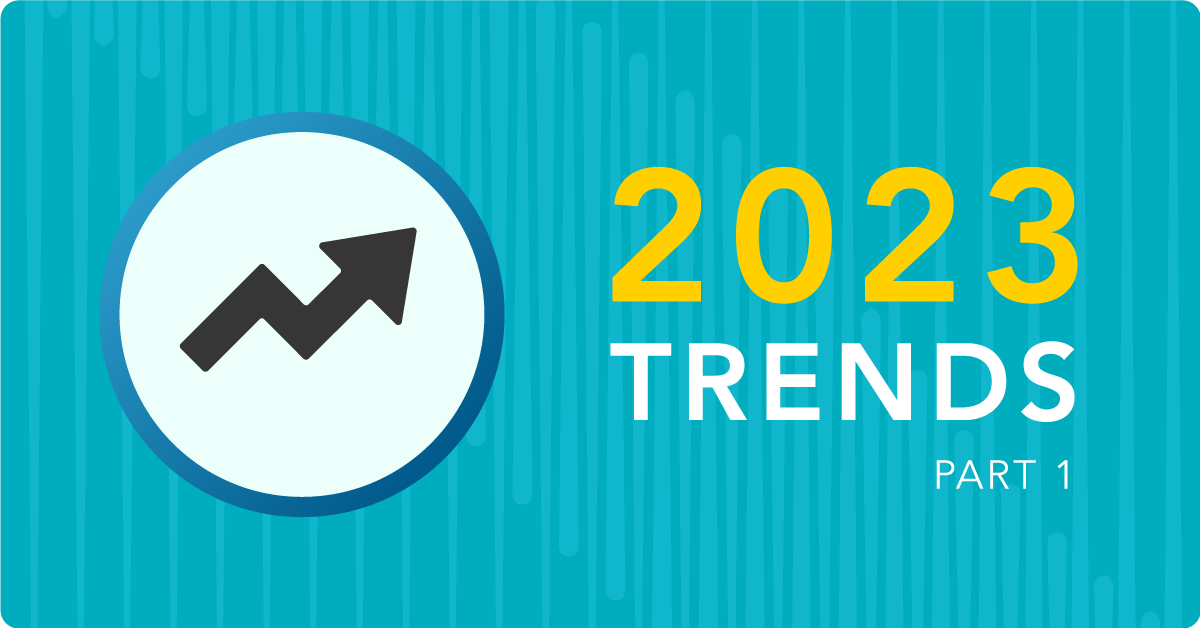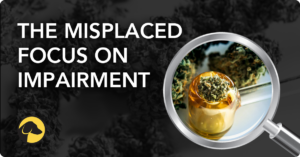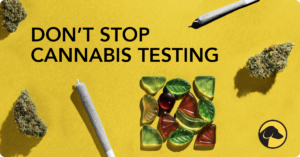
Part One: 2023 Drug Testing Industry Trends
It’s the start of a new year and a time many are apt to look ahead to trends likely to unfold in the coming months. For the last several years, our team at Hound Labs has been asked regularly (regardless of the time of year), “What do you see changing now that adults in the U.S. have increasing access to legal cannabis use?” It’s also a question we ask others – employers, employees, legislators, union leaders, and law enforcement.
The first installment of this two-part blog series provides insights from these conversations, sharing key takeaways from some of our Hound Labs leaders. I open this blog by addressing the importance of continuing cannabis testing while fostering safe and fair work environments. Then, Sammie Dabbs, Executive Vice President of Sales at Hound Labs, discusses the need for policies to focus on deterrence rather than impairment. Next, Jessica Cohen Taubman, a compliance and legal affairs expert, shares why more employers may move away from zero-tolerance testing policies. And finally, Jaime Feinberg, one of our safety + risk leaders, concludes with an excellent summary of how modern drug testing policies can help create work environments that are both physically and psychologically safe.
JENNY LYNN – CO-FOUNDER + CHIEF MARKETING OFFICER
As we enter the second decade of legal recreational and medicinal cannabis use, two important themes stand out to me. The first is testing. The vast majority of employers now understand the key to addressing legal cannabis use is to continue cannabis testing. According to a recent survey by the National Safety Council,1 most employers experience an increase in incidents and a decline in performance after discontinuing cannabis testing.
The second common theme is balancing workplace safety and employee privacy with policies focused on deterring workday use. In the coming year, we anticipate that more companies will adapt their drug testing policies to meet the needs of employers, employees, customers, and others with a vested interest in maintaining safety while also recognizing the realities of legal cannabis use.
SAMMIE DABBS – EXECUTIVE VICE PRESIDENT OF SALES
Author and inspirational speaker Simon Sinek2 often says, “Start with why.” In workplace drug testing, the why is straightforward – drug testing began to detect and deter substance use to prevent workplace safety incidents and the resulting loss of life. Decades later, that initial purpose is even more relevant in an environment where most employees can use cannabis legally.
The mission of workplace drug testing has been somewhat complicated by a fruitless search for a universal impairment standard for cannabis. This search is fueled partly by some legislatures passing laws that include “impairment” language, and incorrectly applying blood alcohol content (BAC) standards to establish the same precedent for cannabis. Meanwhile, the research required to set a per se legal impairment limit for cannabis is impeded by the drug’s federal classification as a Schedule I illegal drug.
The resulting confusion about impairment creates a nearly impossible situation for employers. As we established, workplace drug testing has never been about proving impairment but rather detecting and deterring substance use. As the years progress, more and more employers will rely on a cannabis breath test to help navigate the complexities of legal cannabis and to help achieve the original intent of workplace drug testing – detecting and deterring workday use.
JESSICA COHEN TAUBMAN – MANAGER OF COMPLIANCE + LEGAL AFFAIRS
The past decade has been interesting from a legal perspective as we have watched the era of cannabis legalization being ushered in with gusto we haven’t seen in many other areas of law. States have legalized both medicinal and recreational adult use, with more poised to follow suit. In 2022 we also saw the first legislation to address non-active THC metabolites, a differentiation we haven’t seen in legislative language in previous years. With employers trying to navigate this new legal reality, it makes more sense to pivot to recent use testing, rather than to rely on legacy testing practices that haven’t evolved. We expect employment attorneys specializing in workplace cannabis issues will see an influx of requests for guidance as organizations move forward in modernizing their drug testing policies and programs and away from zero-tolerance policies that are no longer practical or potentially even legal.
Additionally, the Biden administration may continue its efforts to address some cannabis-related concerns. In October, President Biden laid out his plan to correct what he calls a “failed approach to addressing marijuana.”3 His plan includes pardoning prior federal offenses for simple marijuana possession,4 an act intended to give previous offenders improved access to employment, housing, and educational opportunities. And, in December, President Biden signed a cannabis research bill into law. The “Medical Marijuana and Cannabidiol Research Expansion Act” will make it easier to conduct cannabis research, something the federal government has yet to undertake. With these efforts gaining momentum both from members of Congress and the public, it will be interesting to see if anything moves forward in the year ahead.
JAIME FEINBERG – VICE PRESIDENT OF PARTNERSHIPS FOR INSURANCE, RISK, + SAFETY
Policies are an essential part of any company. They establish expectations and guidelines, help ensure compliance with laws and regulations, provide direction for decision-making, and streamline operations. Policies should not cause angst among employees and managers. However, drug testing policies often fall into this angst-causing category, especially when addressing cannabis use. This situation usually arises because current policies and testing methods have not caught up with technology advancements, advocacy efforts, and legalization reforms.
This year, organizations may want to focus on creating cannabis testing policies that make employees feel safe and secure. Companies can establish policies rooted in psychological safety to stem feelings of apprehension and uneasiness among employees.5 Amy Edmondson, author of the book, “The Fearless Organization: Creating Psychological Safety in the Workplace for Learning, Innovation, and Growth,” says psychological safety is “a belief that the environment is safe for interpersonal risk-taking – like speaking up with a question, a concern, an idea, or even a mistake.” At its root, psychological safety comes down to perception. Employees who feel safe are better positioned to thrive in the workplace. Conversely, employees who don’t feel protected from a physical or perceived hazard may be less likely to reach peak performance levels.
Here are some considerations organizations may want to think about in 2023 to help foster a psychologically safe environment:
- Avoid confusing or ambiguous language
- Communicate policies often and in different ways
- Include all employees, not just safety-sensitive positions
- Establish a second chance program
- Train all employees to recognize and respond to substance use in the workplace
- Build a trusting culture where employees are supported when they speak up
And remember, employers with the most effective cannabis testing programs have invested time to ensure employees are fully aware of policies that will impact them.
FINAL THOUGHT FROM THE AUTHOR
Wrapping up this installment, I see 2023 as ‘The Year of the Policy.’ Employers will likely adapt their current cannabis drug testing policies to focus on detecting and deterring cannabis use during the workday. This shift will help employers maintain safety, recognize privacy, and fairly address the needs of the many parties impacted by workplace safety and performance issues.
The second installment of Drug Testing Industry Trends features seasoned industry leaders Nina M. French, President of Employer + Law Enforcement Solutions, Aaron Atkinson, Senior Vice President of Marketing, and Don Boian, Chief Information Security Officer. Make sure you don’t miss any Hound Labs content by subscribing to our monthly newsletter.

January 12, 2023
By JENNY LYNN
Co-Founder
Share












